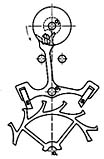HOME
BRANDS
WE SERVICE
SERVICE
PRICE LIST
REPAIR FORM
FAQ'S
ABOUT
US
CONTACT
US
WARRANTY
FACEBOOK
WRITE A REVIEW |
| TITANIUM White-metal watches steel and
platinum are hot. The white-watch trend has spawned a surge in watches made with titanium,
the so-called 'space age' metal. Titanium watches are not as numerous as steel or even
platinum, but you see more now than ever before and still more are on the way. So what is
titanium? What do you need to know about it to talk knowledgeably to customers? The
following briefing should help.
by Joe Thompson |
|
|
|
|
|
|
|
|
 1.What is titanium? 1.What is titanium? Titanium is a metallic element found in the earth's
crust. The element occurs as a bright, lustrous metal or a silver-gray or dark gray
powder. Its compounds are found in practically all igneous rocks and their sand deposits. |
|
|
|
|
 2.What are its
qualities? 2.What are its
qualities? Titanium has a
number of characteristics that make it valuable for industrial and commercial use:
- It's strong: Titanium is 30%
stronger than steel.
- It's light: Titanium weighs in at
47.90 on the atomic scale, nearly 50% lighter than steel. -It resists corrosion: When
exposed to the atmosphere, titanium forms a tight, tenacious oxide film that resists a
variety of materials that corrode other metals. It is especially resistant to salt water
corrosion. |
|
|
|
|
 3.Is it newly
discovered? 3.Is it newly
discovered? Not exactly. The
first mention of titanium in scientific writing occurred in 1791, when an amateur British
scientist, William Gregor, analyzed some sand from Comwall and found "a reddish brown
calx" he couldn't identify. He wondered if it was a new metal. Four years later an
Austrian chemist, Martin Heinrich Klaproth, confirmed that Gregor had indeed discovered a
new element. Klaproth named the element "titanium."
The development of titanium alloys for
industrial use, however, is relatively new. Wilhelm Kroll of Luxembourg is recognized as
the father of the modem titanium industry. In the 1930s, he developed a process to
manufacture metallic titanium and refined the process in the 1940s. The Kroll method of
manufacturing titanium metal is still used today.
The titanium metal industry emerged in the
1950s in response to demand from the emerging aerospace industry which used titanium to
build jet planes. |
|
|
|
|
 4.Why do they call it
a "space age" metal? 4.Why do they call it
a "space age" metal? Until
the mid-1970s, more than 85% of titanium produced was used in the aerospace industry.
Titanium's unique properties--density half that of steel, excellent strength retention to
1,000 degrees F and atmospheric corrosion immunity superior to that of other metals--made
it ideal for the construction of the engines and frames of jet planes, rockets and space
craft. The military uses the metal in weapons like guided missiles and recoil mechanisms
in artillery.
Since the 1970s, the price of titanium
mill products has dropped and the metal has been used in a wide range of industries. The
most popular compound is titanium dioxide, common in the production of paint pigment,
paper, plastics, glass and ceramics. jewelers might be interested to know that the
',stars" in star rubies and sapphires are due to the presence of titanium dioxide.
Shipbuilders appreciate titanium's superior resistance to salt water and use it to make
ship propellers, shafts and other parts. The Navy uses it on submarines. |
|
|
|
|
 5. Is titanium rare? 5. Is titanium rare? No. It is the ninth most abundant element in the
earth's crust. There is at least a 10,000year supply of titanium ore. Titanium has also
been found in meteorites and moon rocks and is present in the sun and other stars. |
|
|
|
|
 6. Is it expensive? 6. Is it expensive? Yes. The extraction of titanium from its ores is a
relatively slow and costly process, which makes the metal expensive. For years the high
cost of titanium limited its use to military and aerospace purposes. |
|
|
|
|
 7.Where does the name
come from? 7.Where does the name
come from? Martin Heinrich
Klaproth, the Austrian chemist who confirmed the discovery of the metal, named it after
the Titans, the first sons of the earth in Greek mythology. Their mother was Gaea (Earth).
They were a race of giant deities who ultimately were overthrown by the Olympian gods.
They are associated with great size and strength--hence the word "titanic." The
name is appropriate for an extremely strong element taken from the earth. |
|
|
|
|
 8.What is the benefit
of titanium in watches? 8.What is the benefit
of titanium in watches? Titanium's
unusual features present some distinct advantages to watch wearers. Citizen Watch Co.,
which says it is the world's largest manufacturer of titanium watches, points out that
titanium is particularly well suited for sports and divers' watches. It urges retailers to
be aware of the following points in dealing with customers:
- Titanium watches are quite comfortable
because they are surprisingly light on the wrist. You can feel the difference compared to
a steel watch.
- Titanium is hypoallergenic. It's
nickel-free. Titanium watches can be worn comfortably even when the skin perspires.
- Because the metal is stronger than
steel, titanium watches are more durable.
- The corrosion-resistance feature makes
titanium particularly well suited for divers' watches. Titanium is environmentally
friendly it conies from the earth and is recyclable. |
|
|
|
|
 9.Are there any drawbacks with titanium? 9.Are there any drawbacks with titanium?
Two. One is that titanium is more
expensive than steel. The other is that titanium can be stained and scratched quite
easily. Citizen, for example, compensates for this by using a patented "glass
multi-layer coating" on its Promaster Titanium models which the company says makes
them scratch-resistant |
|
|
|
|

 PRECISION WATCH REPAIR BY CHARLIE SQUIRES
PRECISION WATCH REPAIR BY CHARLIE SQUIRES